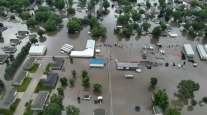Heat Wave Causing More Tire Failures, Adds Strain on Drivers, Fleet Execs Say
This story appears in the Aug. 6 print edition of Transport Topics. Click here to subscribe today.
This summer’s relentless heat wave throughout much of the United States is taking a toll on motor carriers, as executives told Transport Topics of multiple problems, including a spike in tire blowouts.
“We’ve had blown tires all over the place. When these tires come apart, they tear off fenders and bumpers on our tank trucks,” said Carl Brune, vice president at fuel hauler McKinley Trucking Inc., Carson City, Mich.
Brune said his company normally experiences five or six tire failures a week during the summer. But those numbers have doubled this year. McKinley operates 57 tractors with tank trailers.
Jay Smith, president of dry van hauler Cox Transportation Services, Ashland, Va., said his company’s tire failures have increased about 50% this summer.
Likewise, truckload carrier B.R. Williams Trucking Inc., Oxford, Ala., said blown tires are up 50% to 60%.
“It’s unusually high this year,” said CEO Greg Brown.
At Foster’s Tire and Road Service, a truck-tire repair company in Holly Springs, Miss., service calls have gone up at least 25%, said owner Dwayne Foster.
“All we do is tires,” Foster said. “The hotter it gets, the more business there is for us.”
Besides tire failures, there are more problems this summer with cooling systems, said Jeff Bussanmas, operating manager at Bussanmas Towing & Recovery in Bevington, Iowa.
He said water pumps and water hoses appear to be failing more frequently in this extreme heat, resulting in more service calls.
The heat also is putting additional strain on truck drivers, executives said.
“Our drivers have to watch, standing on hot concrete, while unloading and loading gasoline and diesel,” McKinley’s Brune said. “The heat just wears on you and slows you down.”
Hazmat drivers must suit up in protective clothing, sometimes with face shields, and stand next to their rigs while loading and unloading, said Mont Switzer, president of tank truck hauler Switzer Transportation Cos., Mount Summit, Ind. “It’s tough on them,” he said.
“All they can do is get a [cold beverage] after loading to rehydrate,” Switzer said.
Because of the heat, he said the company will not dispatch a truck unless it has a properly working air conditioner.
“You don’t want to have a driver sitting out in 102 or 103 degree heat while waiting to be loaded,” B.R. Williams’ Brown said.
To ensure his drivers don’t become heat ex-hausted, the company insists its drivers sit in their cabs to avoid standing outside in the heat.
“So, we have to idle our trucks more, which hurts our fuel efficiency,” Brown said.
Kevin Wallack, maintenance and information technology manager for Refrigerated Food Express, Avon, Mass., said that this summer’s heat has led to intense lightning storms, creating power surges.
Wallack said that during a July 18 storm, a surge knocked out the application server at his company’s headquarters.
“We lost two memory slots on the app server so we couldn’t access our system for a while,” he said.
Likewise, a recent storm knocked out all of McKinley Trucking’s power, Brune said.
“It affected our dispatching because everything we do is on computers . . . so our drivers couldn’t get their loads,” he said. “We had generators running because the air conditioning was off in our computer rooms and the alarms were going off.”
The outage lasted for 16 hours and took four days to recover from, he said.



